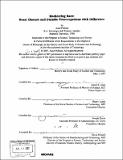Medicating race : heart disease and durable preoccupations with difference
Author(s)
Pollock, Anne, 1975-
DownloadFull printable version (21.82Mb)
Other Contributors
Massachusetts Institute of Technology. Program in Science, Technology and Society.
Advisor
David S. Jones.
Terms of use
Metadata
Show full item recordAbstract
This dissertation is an examination of intersections of race, pharmaceuticals, and heart disease over the course of the 20th century and today. Each of these parts has had a dynamic history, and when they are invoked together they provide a terrain for arguments about interventions in health and in justice in the present. An enduring aspect of discourses of heart disease over the past century has been articulating connections between characterizations of the modem American way of life and of heart disease. In that process, heart disease research and practice has participated in differentiating Americans, especially by race. This dissertation uses heart disease categories and the drugs prescribed for them as windows into racialized medicine. The chapters are organized in a way that is roughly chronological, beginning with the emergence of cardiology as a specialty just before World War II and the landmark longitudinal Framingham Heart Study that began shortly thereafter. A central chapter tracks the emergence and mobilization of African American hypertension as a disease category since the 1960s. (cont.) Two final chapters attend to current racial invocations of two pharmaceuticals: thiazide and BiDil. Using methods from critical historiography of race, anthropology, and science studies, this thesis provides an account of race in medicine with interdisciplinary relevance. By attending to continuities and discontinuities over the period, this thesis illustrates that race in heart disease research and practice has been a durable preoccupation. Racialized medicine has used epistemologically eclectic notions of race, drawing variously on heterogeneous aspects that are both material and semiotic. This underlying ambiguity is central to the productivity of the recorded category of race. American practices of medicating race have also been mediating it, arbitrating and intervening on new and renewed articulations of inclusion and difference in democratic and racialized American ways of life.
Description
Thesis (Ph. D. in History and Social Study of Science and Technology (HASTS))--Massachusetts Institute of Technology, Program in Science, Technology and Society, 2007. Includes bibliographical references (p. 320-350).
Date issued
2007Department
Massachusetts Institute of Technology. Program in Science, Technology and SocietyPublisher
Massachusetts Institute of Technology
Keywords
Program in Science, Technology and Society.